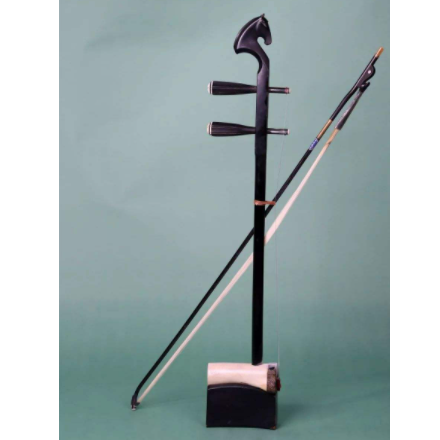The origin and legend of Maguhu
Maguhu is a stringed instrument originating from the Xiqin type. It was first popular in Xilin, Longlin, Tianlin, Baise, Jingxi, Debao area of Guangxi Zhuang Autonomous Region and Zhuang areas in Yunnan, Hunan and other provinces.

Since the early Qing Dynasty, with the further consolidation and development of a unified multi-ethnic country, the cultural exchanges between various ethnic groups have become more frequent, and many new varieties of stringed instruments have been added.
In the Qing Dynasty, in addition to the original two-stringed huqin or erhu, the four-stringed four-hued huqin appeared, which was specially used to accompany Peking Opera. There are also many stringed instruments in ethnic minority areas, such as the horse bone hu from the Zhuang people in Guangxi.
In the beginning, people often picked up Zhuang folk musical instruments such as horse bone hu, earth hu, gourd hu and Zhuang flute to play in neighboring villages during festivals, which was called "youyuan". (It is an early form of ensemble of eight main musical instruments, including horse bone hu, earth hu, gourd hu, sanxian, strong flute, eight-tone gong, eight-tone drum, and small cymbal).
Ma Gu Hu has always been the main accompaniment instrument in the entire development and evolution process of Youyong Opera - Bench Opera - "Tuxi Opera" - Zhuang Opera. In 1815, when Longlin County established a semi-professional Zhuang Opera Troupe, the Magu Hu became the lead instrument of the Zhuang Opera Band. Later, it became the lead instrument in the "Eight Tones" band. According to this, Magu Hu appeared in the Qianlong period of the Qing Dynasty (1736-1795), and has a history of more than 200 years.
Folk legend
There is such a touching story in the Zhuangxiang cottage in Guangxi. A long time ago, there lived a smart and handsome girl A Ran and a hard-working and brave young man A Lie. They grew up together, childhood sweethearts, and loved each other very much.
A Lie is a good hunter with a good shot. He often pulls up Tuhu to express his heart to Aran, and Aran expresses his love with loud folk songs. Aran's family has a horse named "Snow with four hooves" with purplish red body and white hooves. It is tall and fat, and its coat is shiny and shiny. It walks like a boat and runs like a fly. One day, the chieftain bought the "four-legged snow" with "heavy money". When he saw Aran who looked like a fairy, he coveted a thousand feet, and even wanted to occupy it, so he ordered people and horses to snatch back the cottage. The chieftain forced the marriage, and Aran Ning died and was locked in a dark room in the backyard.
Toast was so overwhelmed with pride that when he was testing the horse, his head was smashed to death. He was so embarrassed that he sent someone to kill the "four-hoof snow". If you don't marry him, you have to skin and eviscerate like a horse. Aran was very saddened to see the misfortune of her beloved "Snow with Four Hoofs". She pulled off some of the long ponytails, picked up the thigh bones of a horse, and asked a poor man who was a long-term worker in the Tusi's house to take it to Alie. Allie was in pain, so he used the horse's leg bone as the qin barrel and the horse's tail as the bow hair to make a unique horse bone moustache.
From the beautiful sound of the piano, Aran learned when and how Arie rescued her. At night, Alie climbed a high wall, rescued Aran, and shot the toast who was chasing to death. From then on, they left the cottage where they were born together, traveled all over Zhuang Township to teach horse bone beard skills, and carved horse heads as decorations on the top of the qin. Later, the beautiful sound of the horse-bone hu rang in the villages and villages. In order to commemorate the young people Aran and Alie who taught the horse-bone hu, people called the horse-bone hu "Ran Lie", which has been passed down from generation to generation and has been passed down to this day. .
 渝公网安备 50010702504639号
渝公网安备 50010702504639号